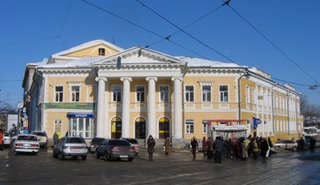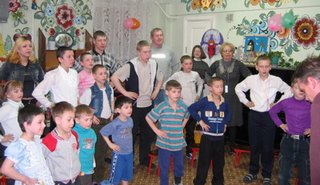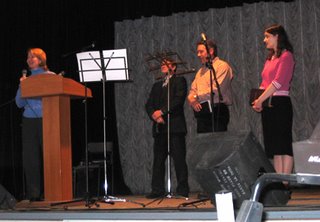I must confess that I'm at a loss to explain how Pope Benedict thought his recent remarks about Islam would do anything but inflame things. I figured if I read them in context, it might help things (since the news reports were all extremely terse in this regard). I've excerpted some passages below, but you can also read the whole speech
here.
I've summarized parts below since it is supposedly one of his most important speeches. It's interesting, but I just can't see how the quote he got in trouble for really adds anything to what he was trying to say and it clearly ended up distracting from the message he tried to get across.
Or did it? He's a shrewd man. Is it possible that he intended to provoke the response he got in order to highlight his point: The need for reason and dialog to enter into the discussion or religion, be it intra- or inter-cultural dialog?
He starts out reminiscing about his days teaching theology at the University of Bonn. He spoke of how wonderful it was when once a semester, all the professors would appear before the students, "making possible a genuine experience of universitas: the reality that despite our specializations which at times make it difficult to communicate with each other, we made up a whole, working in everything on the basis of a single rationality with its various aspects and sharing responsibility for the right use of reason - this reality became a lived experience," and goes on to remark how, "This profound sense of coherence within the universe of reason was not troubled, even when it was once reported that a colleague had said there was something odd about our university: it had two [theological] faculties devoted to something that did not exist: God."
He then makes the offending remarks...
""I was reminded of all this recently, when I read the edition by Professor Theodore Khoury (M�nster) of part of the dialogue carried on - perhaps in 1391 in the winter barracks near Ankara - by the erudite Byzantine emperor Manuel II Paleologus and an educated Persian on the subject of Christianity and Islam, and the truth of both. It was probably the emperor himself who set down this dialogue, during the siege of Constantinople between 1394 and 1402; and this would explain why his arguments are given in greater detail than the responses of the learned Persian. The dialogue ranges widely over the structures of faith contained in the Bible and in the Qur’an, and deals especially with the image of God and of man, while necessarily returning repeatedly to the relationship of the 'three Laws': the Old Testament, the New Testament and the Qur’an. In this lecture I would like to discuss only one point - itself rather marginal to the dialogue itself - which, in the context of the issue of 'faith and reason', I found interesting and which can serve as the starting-point for my reflections on this issue.
In the seventh conversation (*4V8,>4H - controversy) edited by Professor Khoury, the emperor touches on the theme of the jihad (holy war). The emperor must have known that surah 2, 256 reads: 'There is no compulsion in religion'. It is one of the suras of the early period, when Mohammed was still powerless and under threaten. But naturally the emperor also knew the instructions, developed later and recorded in the Qur’an, concerning holy war. Without decending to details, such as the difference in treatment accorded to those who have the 'Book' and the 'infidels', he turns to his interlocutor somewhat brusquely with the central question on the relationship between religion and violence in general, in these words: 'Show me just what Mohammed brought that was new, and there you will find things only evil and inhuman, such as his command to spread by the sword the faith he preached'. The emperor goes on to explain in detail the reasons why spreading the faith through violence is something unreasonable. Violence is incompatible with the nature of God and the nature of the soul. 'God is not pleased by blood, and not acting reasonably (F�< 8`(T) is contrary to God’s nature. Faith is born of the soul, not the body. Whoever would lead someone to faith needs the ability to speak well and to reason properly, without violence and threats... To convince a reasonable soul, one does not need a strong arm, or weapons of any kind, or any other means of threatening a person with death...'.
The decisive statement in this argument against violent conversion is this: not to act in accordance with reason is contrary to God’s nature. The editor, Theodore Khoury, observes: For the emperor, as a Byzantine shaped by Greek philosophy, this statement is self-evident. But for Muslim teaching, God is absolutely transcendent. His will is not bound up with any of our categories, even that of rationality. Here Khoury quotes a work of the noted French Islamist R. Arnaldez, who points out that Ibn Hazn went so far as to state that God is not bound even by his own word, and that nothing would oblige him to reveal the truth to us. Were it God’s will, we would even have to practise idolatry.
As far as understanding of God and thus the concrete practice of religion is concerned, we find ourselves faced with a dilemma which nowadays challenges us directly. Is the conviction that acting unreasonably contradicts God’s nature merely a Greek idea, or is it always and intrinsically true? I believe that here we can see the profound harmony between what is Greek in the best sense of the word and the biblical understanding of faith in God. Modifying the first verse of the Book of Genesis, John began the prologue of his Gospel with the words: 'In the beginning was the 8`(oH'. This is the very word used by the emperor: God acts with logos. Logos means both reason and word - a reason which is creative and capable of self-communication, precisely as reason. John thus spoke the final word on the biblical concept of God, and in this word all the often toilsome and tortuous threads of biblical faith find their culmination and synthesis. In the beginning was the logos, and the logos is God, says the Evangelist. The encounter between the Biblical message and Greek thought did not happen by chance. The vision of Saint Paul, who saw the roads to Asia barred and in a dream saw a Macedonian man plead with him: 'Come over to Macedonia and help us!' (cf. Acts 16:6-10) - this vision can be interpreted as a 'distillation' of the intrinsic necessity of a rapprochement between Biblical faith and Greek inquiry."
He then goes on to criticize the movement to "dehellenize" Christianity and reviews three stages.
1) the reformers of the sixteenth century who "thought they were confronted with a faith system totally conditioned by philosophy, that is to say an articulation of the faith based on an alien system of thought," and countered this with "the principle of sola scriptura [which] sought faith in its pure, primordial form, as originally found in the biblical Word. "
2) The liberal theology of the 19th and 20th centuries as represented in Adolf von Harnack who's "central idea was to return simply to the man Jesus and to his simple message, underneath the accretions of theology and indeed of hellenization: this simple message was seen as the culmination of the religious development of humanity. Jesus was said to have put an end to worship in favour of morality. In the end he was presented as the father of a humanitarian moral message. The fundamental goal was to bring Christianity back into harmony with modern reason, liberating it, that is to say, from seemingly philosophical and theological elements, such as faith in Christ’s divinity and the triune God."
This then leads to two principles:
a) "only the kind of certainty resulting from the interplay of mathematical and empirical elements can be considered scientific. Anything that would claim to be science must be measured against this criterion.
b) "by its very nature this method excludes the question of God, making it appear an unscientific or pre-scientific question."
He then briefly mentions stage three:
3) "In the light of our experience with cultural pluralism, it is often said nowadays that the synthesis with Hellenism achieved in the early Church was a preliminary inculturation which ought not to be binding on other cultures. The latter are said to have the right to return to the simple message of the New Testament prior to that inculturation, in order to inculturate it anew in their own particular milieux."
He then concludes:
And so I come to my conclusion. This attempt, painted with broad strokes, at a critique of modern reason from within has nothing to do with putting the clock back to the time before the Enlightenment and rejecting the insights of the modern age. The positive aspects of modernity are to be acknowledged unreservedly: we are all grateful for the marvellous possibilities that it has opened up for mankind and for the progress in humanity that has been granted to us. The scientific ethos, moreover, is the will to be obedient to the truth, and, as such, it embodies an attitude which reflects one of the basic tenets of Christianity. The intention here is not one of retrenchment or negative criticism, but of broadening our concept of reason and its application. While we rejoice in the new possibilities open to humanity, we also see the dangers arising from these possibilities and we must ask ourselves how we can overcome them. We will succeed in doing so only if reason and faith come together in a new way, if we overcome the self-imposed limitation of reason to the empirically verifiable, and if we once more disclose its vast horizons. In this sense theology rightly belongs in the university and within the wide-ranging dialogue of sciences, not merely as a historical discipline and one of the human sciences, but precisely as theology, as inquiry into the rationality of faith. Only thus do we become capable of that genuine dialogue of cultures and religions so urgently needed today. In the Western world it is widely held that only positivistic reason and the forms of philosophy based on it are universally valid. Yet the world’s profoundly religious cultures see this exclusion of the divine from the universality of reason as an attack on their most profound convictions. A reason which is deaf to the divine and which relegates religion into the realm of subcultures is incapable of entering into the dialogue of cultures. At the same time, as I have attempted to show, modern scientific reason with its intrinsically Platonic element bears within itself a question which points beyond itself and beyond the possibilities of its methodology. Modern scientific reason quite simply has to accept the rational structure of matter and the correspondence between our spirit and the prevailing rational structures of nature as a given, on which its methodology has to be based. Yet the question why this has to be so is a real question, and one which has to be remanded by the natural sciences to other modes and planes of thought – to philosophy and theology. For philosophy and, albeit in a different way, for theology, listening to the great experiences and insights of the religious traditions of humanity, and those of the Christian faith in particular, is a source of knowledge, and to ignore it would be an unacceptable restriction of our listening and responding. Here I am reminded of something Socrates said to Phaedo. In their earlier conversations, many false philosophical opinions had been raised, and so Socrates says: "It would be easily understandable if someone became so annoyed at all these false notions that for the rest of his life he despised and mocked all talk about being - but in this way he would be deprived of the truth of existence and would suffer a great loss". The West has long been endangered by this aversion to the questions which underlie its rationality, and can only suffer great harm thereby. The courage to engage the whole breadth of reason, and not the denial of its grandeur – this is the programme with which a theology grounded in Biblical faith enters into the debates of our time. "Not to act reasonably (with logos) is contrary to the nature of God", said Manuel II, according to his Christian understanding of God, in response to his Persian interlocutor. It is to this great logos, to this breadth of reason, that we invite our partners in the dialogue of cultures. To rediscover it constantly is the great task of the university.














